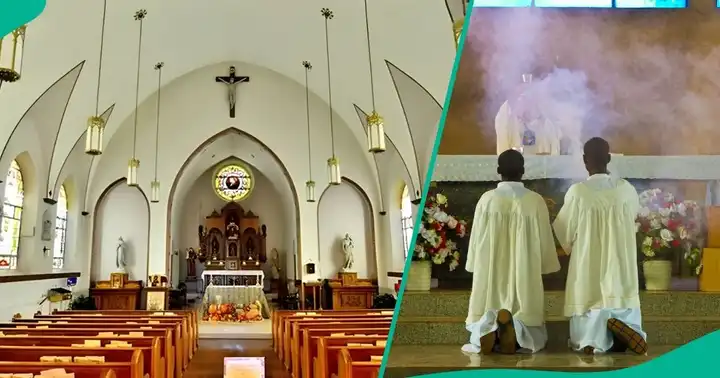Updated: Sunday, August 17, 2025 | By: Ezra Ukanwa | 8 min read
A fresh scandal has rocked the Catholic Diocese of Ijebu-Ode, Ogun State, after a whistleblower alleged years of sexual abuse and homosexual practices involving a Catholic priest. The claims have triggered outrage within the Nigerian Catholic community and renewed calls for accountability from church leaders.
The whistleblower, identified only as Bayo (not his real name), claimed in an interview that he and at least nine other boys were coerced into sexual acts by Reverend Father Kenneth (also not his real name).
Bayo alleged that the priest not only abused him from the age of 14 but also introduced several young boys to homosexuality while rewarding those who complied with special favours within the church.
According to him:
“My ordeal began when I was barely 14. Father Kenneth appeared as a saviour, helping my family during difficult times. I trusted him completely and never imagined he would exploit that trust.”
Bayo recalled moving into the mission house in Ijebu-Ode around 2005 after the priest offered to support his education and spiritual growth. What started as a mentorship, he claimed, turned into years of unwanted sexual activities.
He described being manipulated into intimate encounters, sometimes up to three times a week, and added that the priest convinced him that such acts were a way to remain faithful to his priestly vows since they did not involve women.
“Although I felt bad about the sexual act, I didn’t see anything wrong at the time because I thought priests were only forbidden from relationships with women,” Bayo explained.
Alleged Network of Abuse Within the Diocese
The whistleblower further alleged that he later discovered he was not the only victim. According to him, the priest confided that at least seven out of 13 brothers in the mission house had been involved in similar acts.
He claimed that boys who engaged in these activities received more favour and attention from the priest, while others were sidelined.


Vatican Investigation and Church Response
Following the allegations, the former Bishop of Ijebu-Ode, Father Albert Fasina, reportedly set up an investigative commission. The case was later reviewed by the Dicastery for the Doctrine of the Faith (DDF) in Rome.
The DDF did not remove Father Kenneth from ministry but imposed a canonical rebuke, warning him to avoid “situations that could cause scandal.”
The current Bishop of Ijebu-Ode, Most Rev. Francis Adesina, stated:
“The DDF acknowledged the seriousness of the accusations and instructed Father Kenneth to prudently avoid persons or situations that could compromise his obligations.”
Bayo expressed frustration that much of the evidence he submitted was not forwarded to Rome, alleging collusion within the diocese to protect the priest. He also claimed he received threats after speaking out.
“I feel that the diocese facilitated my departure from Nigeria to conceal deeper secrets. Even after leaving, I was threatened and warned to stay silent,” he said.
Broader Implications for the Catholic Church in Nigeria
The case has reignited conversations about the Catholic Church’s handling of sexual abuse allegations in Nigeria. Critics argue that mere rebukes or warnings are insufficient when minors are allegedly involved.
Bayo insisted that the Church must do more to protect children and restore trust:
“The faithful deserve transparency. Priests must be held to the highest standards. Silence or inaction will only endanger more lives.”
Kano Government’s Stand Against Homosexuality
In a related development, Kano State Governor Abba Yusuf recently reiterated his administration’s strict opposition to groups suspected of promoting LGBT rights or same-sex marriage within the state.
The governor’s remarks highlight Nigeria’s broader social and political climate, where allegations of homosexuality—particularly within religious institutions—remain highly controversial and sensitive.
The homosexuality scandal in the Catholic Diocese of Ijebu-Ode raises urgent questions about accountability, transparency, and the protection of minors within the Church. While the Vatican’s intervention resulted in a rebuke, critics say stronger actions are necessary to prevent future abuse.
As the story continues to unfold, faithful Catholics and human rights advocates alike are watching closely, demanding justice and structural reforms within Nigeria’s religious institutions.